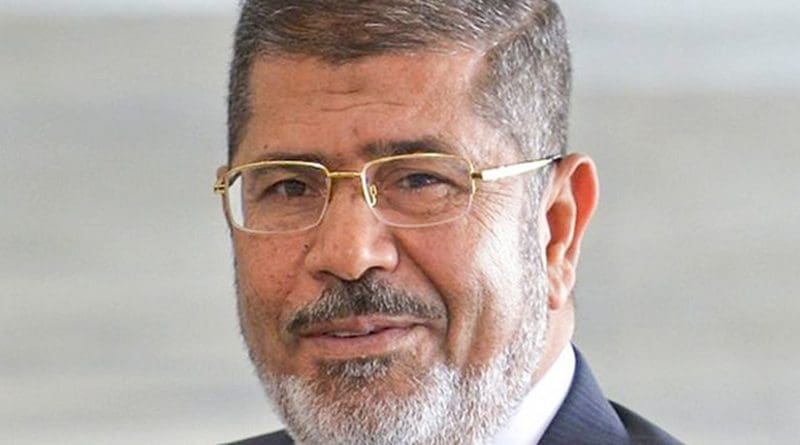Egypt: Morsi Plays The Sectarian Card – Analysis
By Daniel Wagner and Giorgio Cafiero
Last week President Morsi announced that Egypt would be the third Arab state to sever ties with Syria and voiced his support for a western-imposed no-fly zone. He made the announcement while standing with hardline Sunni clerics who called on young Egyptian jihadists to wage a holy war against President Al-Assad’s Army and Hezbollah militants in Syria. While Egypt remains far less influential in Syria than other powers opposed to Assad, Morsi’s shift underscores the Middle East’s dangerous move toward sectarianism. From the start of his presidency, Morsi expressed solidarity with the Syrian rebels and called on Assad to relinquish power. While expressing opposition to foreign military intervention, Egyptian policy was not to arm the Free Syrian Army. Instead, Morsi proposed that local powers (such as Egypt, Iran, Saudi Arabia and Turkey) attempt to resolve the conflict through a negotiated settlement.
As the Syrian crisis has progressed, relations between Egypt and Iran have become warmer, as indicated by restored diplomatic relations, visits between the heads-of-state and renewed bilateral tourism. Morsi’s improved ties with Syria’s most important state sponsor and his inclusion of Iran as party to a proposed diplomatic settlement limited the extent to which he could rightly claim that he had earned revolutionary credentials within the Syrian Muslim Brotherhood and other Sunni Islamist rebels.
The Egyptian leader’s call to arms against Syria’s Ba’athist regime was likely driven by Morsi’s concern about Cairo’s standing with the Egyptian public, western governments and the Gulf Cooperation Council. Morsi’s domestic opposition (largely shaped by the Left, secular-Right and Coptic Christians) has expressed increasing vociferous opposition to his presidency. An opposition movement — “rebel” — claims to have gathered 13 million signatures from Egyptians calling on Morsi to step down. Once Rebel receives at least 15 million signatures (which would surpass the 13.2 of votes that Morsi earned to win the presidency last year), the organization intends to ask the judiciary to order the President to relinquish power. Particularly large demonstrations are expected on June 30, which marks the one year anniversary of Morsi’s presidency.
In this context, Morsi’s new stance on Egypt’s role in the Syrian conflict is driven by an interest in mobilizing his Muslim Brotherhood base and garnering greater support from Egyptian Salafi circles that backed Al-Nour in the 2012 election. While this tactic may successfully mobilize Egypt’s hard-line Islamists and the average Egyptian may share Morsi’s conviction that Assad should step down, it is unlikely that a more aggressive stance against the Assad regime will divert the attention of Egypt’s youth away from their primary sources of discontent – rising living costs, excessive unemployment, energy shortages and a general economic malaise that continues into the third year of the “Egyptian Awakening.”
Among Egypt’s Salafists and circles within the Muslim Brotherhood, the thawing of Egyptian-Iranian relations has cost Morsi support as these conservative voices accuse Iran of seeking to spread Shi’ism throughout Egypt. Washington and several U.S. Arab allies in the Gulf have also watched nervously as Cairo’s ties with Tehran have improved, fearing that the rise of Iran as an Egyptian ally will become an unfortunate legacy of Mubarak’s ouster. As Egypt’s economy desperately needs more foreign aid, Morsi intended to secure partnerships with Egypt’s strategic allies from the post-Nasser era by aligning with the GCC rather than Iran vis-a-vis the Syrian crisis, and to suggest to the Sunni Arab world that the strength of Egyptian-Iranian relations will be limited by the dynamics of the Syrian crisis.
Morsi’s new position on Syria is further confirmation that the Middle East’s tangled web of alliances are forming along increasingly sectarian sides. The stance on Syria taken by the Arab states is almost entirely along Shia-Sunni lines. Except for Algeria and Yemen, all Sunni-led Arab governments have utilized diplomatic, military and/or economic leverage to undermine the Assad regime while attempting to empower the rebels. Assad’s strongest Arab allies are Lebanon’s Hezbollah-led coalition and Nouri Al-Maliki’s Iraqi regime. Yemeni militants have also traveled to Syria to fight alongside the Assad regime, which further underscores the sectarian character of the conflict.
Pan-Sunni Islamism is replacing the concept of pan-Arabism as a result of the internationalization of the Syrian conflict, prompting some of the region’s enduring partnerships to become strained. The cooling of Iran-Hamas and Hezbollah-Hamas ties, coupled with Hamas’ growing partnership with the Justice and Development Party (AKP) in Turkey and the state of Qatar, are indicative of this. So the Syrian conflict is having political repercussions well beyond its borders.
Morsi must realize that he cannot have his cake and eat it too — attempting to embrace Tehran on one hand and the West and rest of the Arab world on the other. He is trying to be all things to all people, which will not work. Morsi obviously understands what is at stake in Syria and how this conflict has had, and will have, a profound impact on the Middle East’s balance of power. By playing this game, Morsi has cast aside any dreams of being perceived as a legitimate Arab peacemaker. Regrettably, this comes at a time when all Middle Easterners could benefit from a leader of a large and influential Muslim state who puts the region’s differences aside in pursuit of peace and stability.
This article was originally posted in The Huffington Post.

